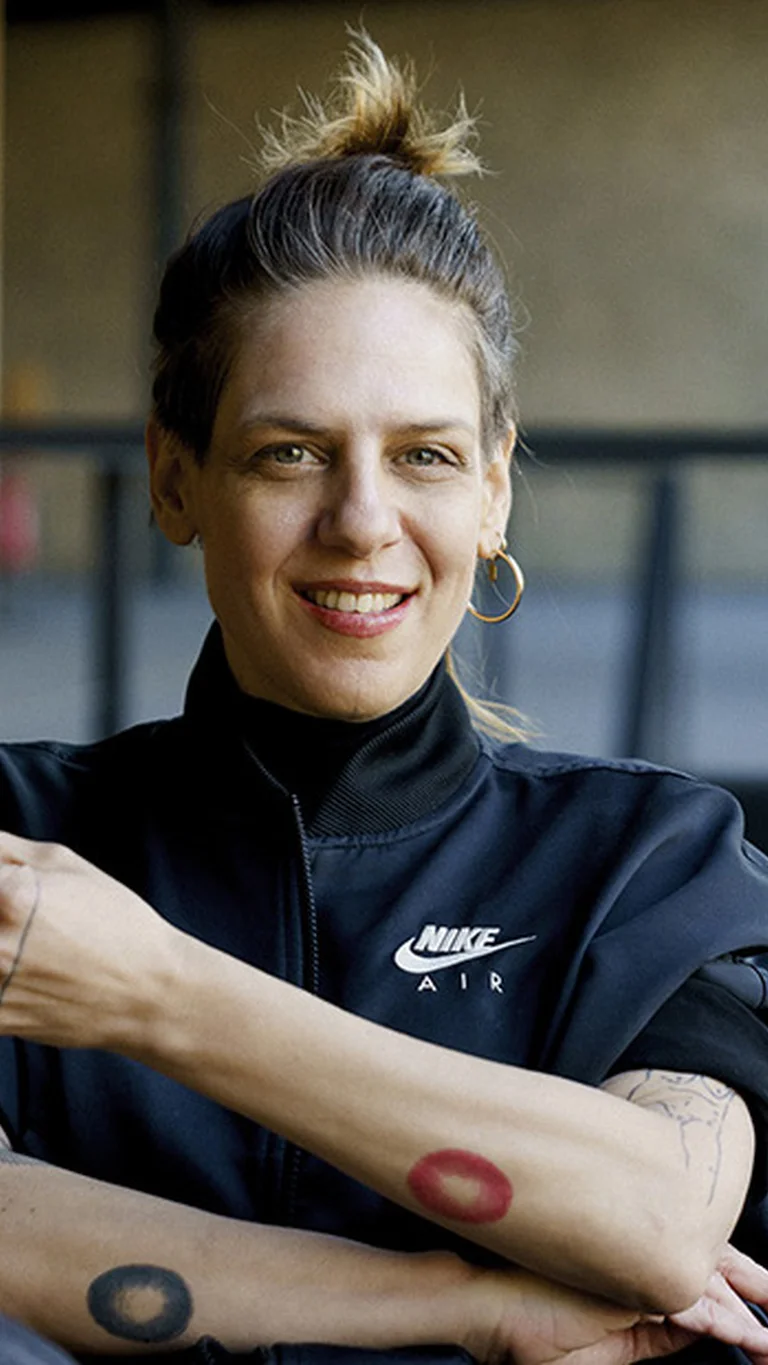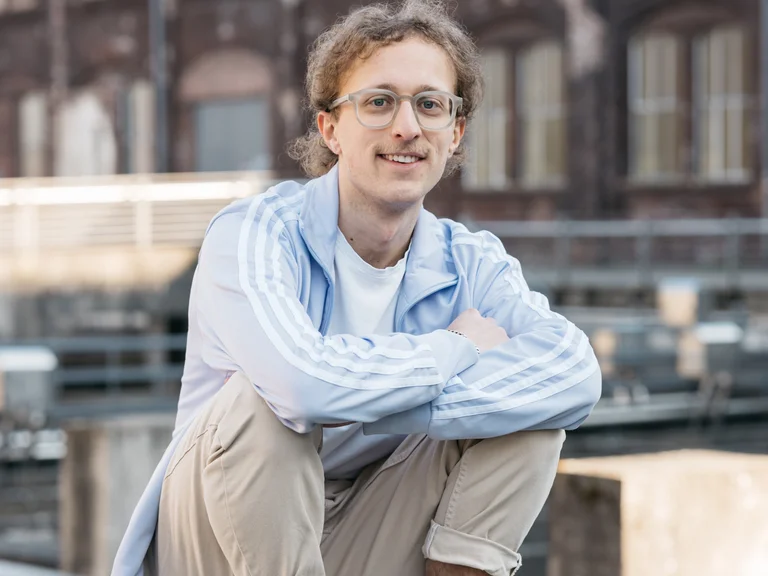
“If we expand our perspective just by one millimetre, we will succeed"
Ruhrtriennale dramaturge Jan Bednorz in conversation with Sivan Ben Yishai
„Und ich denke oft, Vergangenheit und Zukunft sind einander so ähnlich. Die Pathologin und der Wahrsager, der Archäologe und die Science-Fiction-Autorin. Auf gewisse Weise tun sie exakt dasselbe. Sie alle versuchen etwas zu verstehen, zu dem sie nie Zugang haben werden. Seht ihr? In einem Leichnam herumzuwühlen oder sich eine ungewisse Zukunft vorzustellen, auf eine Art ist das genau dasselbe, es ist genau dasselbe.“
Excerpt from Like Dovers Do (Memoirs of Medusa) by Sivan Ben Yishai, published by Suhrkamp Theatre
The interview was conducted by Jan Bednorz, dramaturge at the Ruhrtriennale, who curated Brave New Voices 2025 together with Sivan Ben Yishai.
Jan Bednorz: Sivan, you are this year's host of the Brave New Voices series. Can you briefly introduce yourself to our readers?
Sivan Ben Yishai: My name is Sivan Ben Yishai. I’ve been living in Berlin for 14 years now, and I would say that I dedicate my time exclusively to writing. I used to work more in the realm of stage. I used to direct, I used to perform. Now, I dedicate my time to words. Paradoxically, I would say that once I immigrated and changed the language in which I operate, I started to write. I write in English. My English is translated into German, and in this spectrum between the languages — Hebrew, my native language; English, the language in which I write; and German, the language in which my plays are performed and my essays are read — I think and live, both privately and politically.
Which topics do you deal with in your literature?
I think of Hervé Guibert, who said he was like the scientist and the rat he or she cuts open. In that sense, I take something like a biopsy of my own body — my private, social, and political body — dissect it and zoom into it. The themes I repeatedly encounter are situated in a spectrum between feminist struggles and the question of whether these struggles ever end. Another topic I explore is what I call the Israeli–Palestinian–German Bermuda Triangle — the area where discourses end and writing could begin. A third topic is institutional critique, particularly in the context of theater: its legacy, institutional power hierarchies, and questions of what makes a better democratic institution. It's never about one theme but more about the fluid area between them.
What challenges do you see for art in the current socio-political situation?
As an artist, I ask myself, where should we hear our resistance? Which protests are we joining? Which protests are we leading? Are the protests that we are leading only the protests that are related to budget cuts, salaries or job cuts? Or do we find a way to refer to our body as an art industry or art world, analyze it and see how it helps us understand the changes that our society is going through right now under those strong forces that are taking over the country, the city, the world.
Longing for Tomorrow is the motto of the Ruhrtriennale under the artistic direction of Ivo Van Hove: What do you see as the most pressing issues of today and what are the issues of tomorrow?
When I think about tomorrow, I actually think about another legacy that is rather colonial, rather imperialist, rather patriarchal, rather product driven. A legacy that trains us to think with formulae and scripts, trains us to think with huge stage designs. Whereas actually the deep questions of our time, the deep problems of our time are seeking an answer right now.
We are collecting new tools now or trying to collect new tools in order to think again about resistance, in order to think again about living and surviving. Thinking about supporting our neighbors, understanding who our communities are and how we can create alliances.
„I imagine a room that [...] includes a poetic and political position. And I imagine a room that would represent voices that normally are not present in certain discussions.“
What does an ideal discourse space look like for you?
When I think about the room that we are going to create in and for Brave New Voices, I'm thinking about the way that I work with my language. We are willing to create an inter-generational room, inter-thematic and inter-lingual room. So for example, I think in Hebrew, write in English and communicate in German. I like to speak in English in order to express myself in the best way. And I like my guests to express themselves in German in order for them to be like in the area where they could understand and feel the language in the best way.
It's a room that is vulnerable in a certain way. I always feel that I write with the broken bone. I write with mistakes. I redefine mastership in a certain way. My ideas will not necessarily perform through fancy vocabulary, but they have to make their way in a different form. And this is how I imagined this room. I imagine a room that could approach a topic from different positions. I imagine a room that includes an expert, includes a poetic and political position. And I imagine a room that would represent voices that normally are not present in certain discussions. I imagine an expert speaking with a non-expert, trying to find and understand the collision that is us in the world right now, or us trying to handle a certain political reality.
What characterises the Brave New Voices format for you? How do we transfer this utopia into the discourse space that we want to establish in the four events?
We want to create a form of an ecosystem that holds together different voices, different bodies, different ages. I see stage animals and I see our audience, and they see us all, speaking and engaging in a discussion that has no conclusion and that cannot reach a solution necessarily. We are not looking for a product solution but we are looking for an intelligent discussion. And we want to expand our positions and our understandings, maybe even one millimeter. I believe that if we will do that, we will probably succeed.
„We don't mean to come and give a lecture about the topics but we want to get into the nexus between the them.“
What topics do we want to discuss on the Brave New Voices stage? Where do you see the connection between the topics?
When the curation for this version of Brave New Voices was done by the dramaturgue of the series, Jan Bednorz and myself, we actually made the decision to go through a wide spectrum of topics. We are speaking about capitalism and climate crisis, climate change and climate justice. We are on the spectrum between loneliness and AI. By that we don't mean to come and give a lecture about the topics, but we want to get into the nexus between the topics, the area where they are all entangled in one another. That means that there is no chance to speak about capitalism without speaking about AI in some way. And there is no way to speak about loneliness without speaking about AI. So we are trying, in a way, to find this elusive, sneaky area between the topics and the way that it embodies and performs in our bodies. We will try to collect experiences and we will try to see and understand the way that those topics come into play in our thinking, in our art making and in our political analysis of the time.
This year we are thinking of Brave New Voices in the plural: in a multitude of voices and bodies that come together here, complementing and perhaps contradicting each other. Sivan, how does it all come together?
The Brave New Voices series will take place starting from 21 August, every Sunday at Jahrhunderthalle Bochum. We will speak in German and in English. We will speak with a multiplicity of guests and voices. We will have young voices. We will have voices that hold a lot of expertise. We will try to look for the connections between one and another. In a way, we see this series as a whole,. Four meetings that make one full discussion. So we will be looking forward for everyone to join us and to speak with us. We will be willing to clear of space, for voices to intervene and to join us into a discussion from which we could get out with at least one new thought in our minds and one idea about the present we live in and the future that we are stepping into.
About the author
Jan Bednorz, born in 1999 in the Ruhr area, a self-confessed ‘GenZler’, is part of the dramaturgy team of the Ruhrtriennale. During his bachelor's and master's degrees in German and philosophy, he worked at the Schauspielhaus Bochum, was part of Club.Ruhr, the young Freundeskreis of the Ruhrtriennale, and assisted in various theatre productions. As an author for the cultural magazine STROBO – the magazine for the young scene in the Ruhr region – he regularly portrays the cultural highlights in the Ruhr region. He is also training to become a theatre educator.
